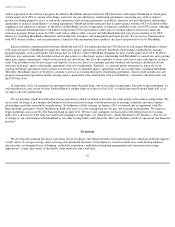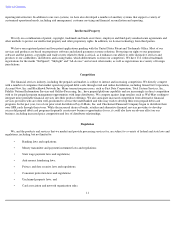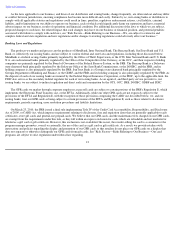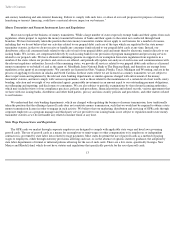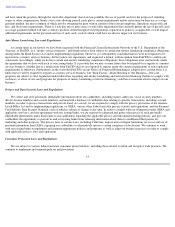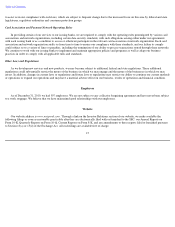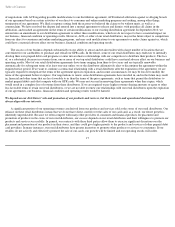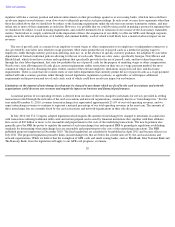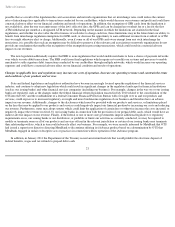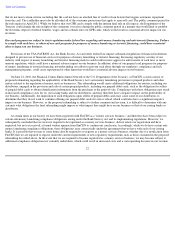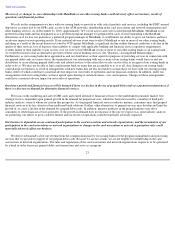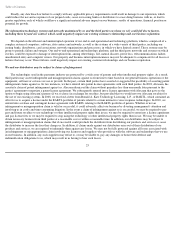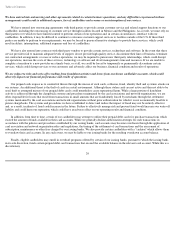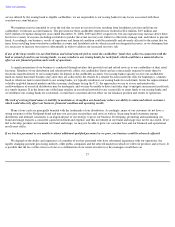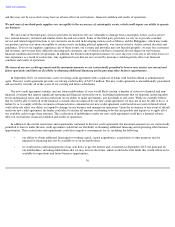NetSpend 2010 Annual Report Download - page 24
Download and view the complete annual report
Please find page 24 of the 2010 NetSpend annual report below. You can navigate through the pages in the report by either clicking on the pages listed below, or by using the keyword search tool below to find specific information within the annual report.
Table of Contents
regulator will take a contrary position and initiate enforcement or other proceedings against us or our issuing banks, which in turn could have
an adverse impact on our business, even if we were to ultimately prevail in such proceedings. In such event, we may have arguments other than
those described above that we should not be subject to the licensing requirements under the relevant state money transmitter statutes, and may
utilize one or more of these arguments at such time. However, it is possible that we could be unsuccessful in making a persuasive argument that
we should not be subject to such licensing requirements, and could be deemed to be in violation of one or more of the state money transmitter
statutes. Such failure to comply could result in the imposition of fines, the suspension of our ability to offer our GPR cards through corporate
employers in the relevant jurisdiction, civil liability and criminal liability, each of which would likely have a material adverse impact on our
revenues.
The use of payroll cards as a means for an employer to remit wages or other compensation to its employees or independent contractors is
also governed by state labor laws related to wage payments. Most states permit the use of payroll cards as a method of paying wages to
employees, either through statutory provisions allowing such use, or, in the absence of specific statutory guidance, the adoption by state labor
departments of formal or informal policies allowing for the use of such cards. There are a few states, specifically Georgia, New Mexico and
Rhode Island, which do not have statutes and regulations that specifically provide for the use of payroll cards, and have taken the position,
through the state labor department, that state law prohibits the use of payroll cards for the purpose of remitting wages or other compensation.
Nearly every state allowing payroll cards places certain requirements and/or restrictions on their use as a wage payment method, the most
common of which involve obtaining the prior written consent of the relevant employee, limitations on payroll card fees, and disclosure
requirements. There is a risk that one or more states or state labor departments that currently permit the use of payroll cards as a wage payment
method will take a contrary position, either through revised legislation, regulation or policies, as applicable, or will impose additional
requirements on the provision and use of such cards, each of which could have an adverse impact on our business.
Limitations on the amount of interchange fees that may be charged to merchants which are fixed by the card associations and network
organizations could decrease our revenues and negatively impact our business and financial performance.
A material portion of our operating revenues is derived from our share of the fees charged to merchants for services provided in settling
transactions routed through the networks of the card associations and network organizations, commonly known as "interchange fees." For the
year ended December 31, 2010, revenues from interchange fees represented approximately 21.6% of our total operating revenues, and we
expect interchange revenues to continue to represent a material percentage of our total operating revenues in the near term. The amounts of
these interchange fees are currently fixed by the card associations and network organizations in their sole discretion.
In July 2010, the U.S. Congress adopted legislation which requires the amount of interchange fees charged to merchants in connection
with transactions utilizing traditional debit cards and certain prepaid cards issued by financial institutions that, together with their affiliates,
have assets of $10 billion or more, to be reasonable and proportionate to the costs of the underlying transactions. The new legislation also
generally gave the FRB the power to regulate the amount of such interchange fees and required FRB to promulgate regulations establishing
standards for determining when interchange fees are reasonable and proportionate to the costs of the underlying transactions. The FRB
published proposed regulations in December 2010. The final regulations are scheduled to be published in April 2011 and become effective in
July 2011. The proposed regulations prescribe limits on interchange fees that are below the current rates set by the card associations and
network organizations. While we believe that the exemption of GPR cards and small issuing banks, such as MetaBank, Inter National Bank and
The Bancorp Bank, from the legislation will apply to our GPR card programs, it remains
20


